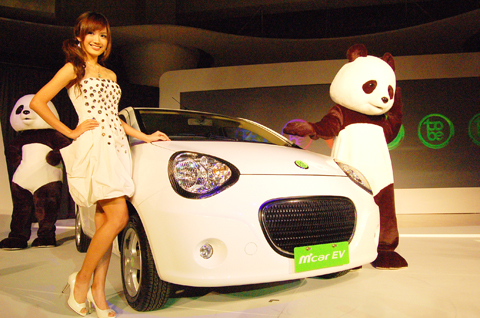Following the launch of its first own auto brand “Luxgen” (納智捷) in September, Yulon Motor Co (裕隆汽車) yesterday unveiled a second brand — “Tobe” (酷比) — that will target the domestic and export markets.
The nation’s biggest automaker plans to start exporting Tobe cars to Vietnam next month, which will be followed shortly by sales to the Philippines, China and the Middle East, Hsu Kuo-hsing (許國興), president of Yulon Tobe Motor Co (裕隆酷比汽車), told reporters on the sidelines of the launch.
Yulon Tobe was founded with a capital of NT$200 million (US$6.1 million) and is 100 percent owned by Yulon Motor.

PHOTO: KAO CHIA-HO, TAIPEI TIMES
Hsu refused to reveal export figures, saying the company was waiting for market feedback after Tobe’s launch.
Tobe cars are a revamped model based on the Panda car of Chinese automaker Geely Automobile Holdings Ltd (吉利汽車), a technology partner of Yulon.
Hsu said more than 35 percent of the car parts — including the engine, car seats, gears and windshield — were designed or enhanced in Taiwan to cater to local demand and regulations, and the cars have passed stringent safety tests, allaying some buyers’ concern that they could be purchasing a “made in China” car.
Yulon Tobe and Geely are going to work more closely on exporting Tobe cars, either using the Tobe or Geely brand when marketing them in different markets in the future, Hsu said.
“Major automakers around the world have set up bases in China, and a lot of car components are produced there. It is the trend,” Yulon Tobe chairman Chen Kuo-rong (陳國榮) said.
He said Tobe was the first product of the company’s cooperation with China in terms of technology transfer, adding that Yulon’s strength in electric cars could be applied to Tobe cars.
Taiwanese consumers would see the first Tobe 1,300cc M’ Car (pronounced my-car) hit the road in January, with a price tag of about NT$400,000.
“This is the price range wherein we see no competition at all,” said Chen, adding that university students and young adults would be drawn to its affordability.
The company expects to sell up to 500 M’ Cars per month in Taiwan next year. It also hopes to launch an electric-version when the market for electric cars becomes more mature and gains subsidies from the government, Yulon Tobe said.
Thanks to the commodity tax cut of NT$30,000 imposed by the government to boost car sales this year, Taiwan’s new vehicle sales jumped 49.1 percent year-on-year to 25,829 units last month, statistics from the Ministry of Transportation and Communications showed.
Cumulative sales in the first 10 months of the year rose 9.4 percent to more than 218,000 units, the ministry said.
The tax cut expires on Dec. 31.
“Discontinuing the tax cut next year would impact the industry, and every carmaker has to compete on the same ground,” Yulon Tobe’s marketing executive Steven Lo (羅明德) said.

The Eurovision Song Contest has seen a surge in punter interest at the bookmakers, becoming a major betting event, experts said ahead of last night’s giant glamfest in Basel. “Eurovision has quietly become one of the biggest betting events of the year,” said Tomi Huttunen, senior manager of the Online Computer Finland (OCS) betting and casino platform. Betting sites have long been used to gauge which way voters might be leaning ahead of the world’s biggest televised live music event. However, bookmakers highlight a huge increase in engagement in recent years — and this year in particular. “We’ve already passed 2023’s total activity and

Nvidia Corp CEO Jensen Huang (黃仁勳) today announced that his company has selected "Beitou Shilin" in Taipei for its new Taiwan office, called Nvidia Constellation, putting an end to months of speculation. Industry sources have said that the tech giant has been eyeing the Beitou Shilin Science Park as the site of its new overseas headquarters, and speculated that the new headquarters would be built on two plots of land designated as "T17" and "T18," which span 3.89 hectares in the park. "I think it's time for us to reveal one of the largest products we've ever built," Huang said near the

China yesterday announced anti-dumping duties as high as 74.9 percent on imports of polyoxymethylene (POM) copolymers, a type of engineering plastic, from Taiwan, the US, the EU and Japan. The Chinese Ministry of Commerce’s findings conclude a probe launched in May last year, shortly after the US sharply increased tariffs on Chinese electric vehicles, computer chips and other imports. POM copolymers can partially replace metals such as copper and zinc, and have various applications, including in auto parts, electronics and medical equipment, the Chinese ministry has said. In January, it said initial investigations had determined that dumping was taking place, and implemented preliminary

CUSTOMERS’ BURDEN: TSMC already has operations in the US and is a foundry, so any tariff increase would mostly affect US customers, not the company, the minister said Taiwanese manufacturers are “not afraid” of US tariffs, but are concerned about being affected more heavily than regional economic competitors Japan and South Korea, Minister of Economic Affairs J.W. Kuo (郭智輝) said. “Taiwan has many advantages that other countries do not have, the most notable of which is its semiconductor ecosystem,” Kuo said. The US “must rely on Taiwan” to boost its microchip manufacturing capacities, Kuo said in an interview ahead of his one-year anniversary in office tomorrow. Taiwan has submitted a position paper under Section 232 of the US Trade Expansion Act to explain the “complementary relationship” between Taiwan and the US